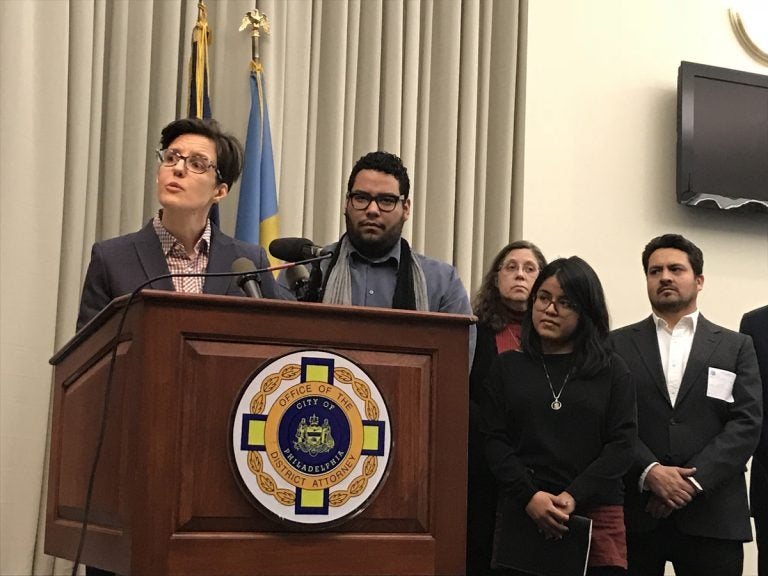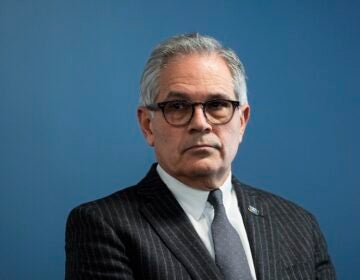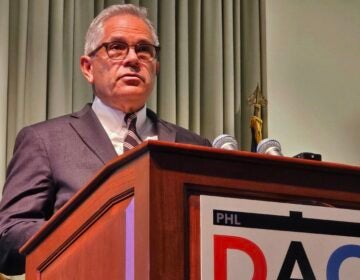Fulfilling campaign vow, Philly DA adds position to focus on immigrant issues
Krasner has hired Caleb Arnold, a former activist, criminal defense attorney, and immigration attorney to oversee this process in the role of immigration counsel.
Listen 1:57
Caleb Arnold (left) is Philadelphia District Attorney Larry Krasner's pick to fill the newly created position of immigrant rights coordinator. (Laura Benshoff/WHYY)
A crime that results in a slap on the wrist for a U.S. citizen can trigger much harsher penalties for immigrants if it affects their ability to remain in the country.
Trying to prevent those disparate consequences, Philadelphia District Attorney Larry Krasner has established a new position to focus on evaluating charges and plea deal offers to keep criminal convictions from resulting in deportations.
“In cases that are not that serious, but have very serious immigration consequences, [defendants] will be offered the opportunity to address their case on a similar, equally serious but not identical charge,” said Krasner.
That could mean changing a charge or plea deal to reflect a conviction with the same punishment as the offense committed, but that falls in a criminal category without any immigration penalties.
Krasner has hired Caleb Arnold, a former activist, criminal defense attorney, and immigration attorney to oversee this process in the role of immigration counsel.
Talking about the kind of cases that could be addressed, Arnold gave the example of a minor drug possession case. A defendant carrying a single Xanax without a prescription, for instance, might be sentenced to a short probation.
However, “that conviction can deport a lawful permanent resident, and there’s nothing you can do to fight it,” said Arnold.
Under the new system, Arnold said, prosecutors could swap that charge for one mentioning a different drug that’s not a federally controlled substance — but that carries the same penalty under Pennsylvania law — to avoid triggering deportation proceedings.
Krasner stressed that the program is not intended to protect those who break the law but to make the criminal justice system fairer and encourage victims and witnesses of crime to come forward.
“It is a position of extreme importance for anyone who thinks that vulnerable people should be protected by the law,” he said.
Immigrant rights advocates at Thursday’s announcement praised the new policy as one that will encourage immigrants to work more closely with Philadelphia police.
Krasner’s policy is modeled on a program launched last year by Brooklyn District Attorney Eric Gonzales that’s resulted in more than 200 cases where prosecutors successfully sought “immigration-neutral” outcomes for criminal offenses.
The move to lessen deportations for minor crimes in Philadelphia mirrors other city policies that try to distance local policing from federal immigration enforcement while not interfering with U.S. Immigration and Customs Enforcement work.
Last year, the U.S. Department of Justice tried to withhold more than $1.5 million in federal public safety grants in order to force Philadelphia to adopt policies that would make it easier to transfer people from local jails to federal immigration custody. In a subsequent lawsuit filed by Philadelphia, a federal judge sided with the city. The Department of Justice has appealed that decision.
Unable to access city jails, ICE now arrests immigrants with or without criminal records in Philadelphia courthouses.
In a statement, ICE officials responded to Krasner’s new policy by saying “U.S. Immigration and Customs Enforcement will continue to work with Philadelphia officials, as well as our other law enforcement partners, as part of the agency’s ongoing efforts to uphold public safety and border security.”
WHYY is your source for fact-based, in-depth journalism and information. As a nonprofit organization, we rely on financial support from readers like you. Please give today.




